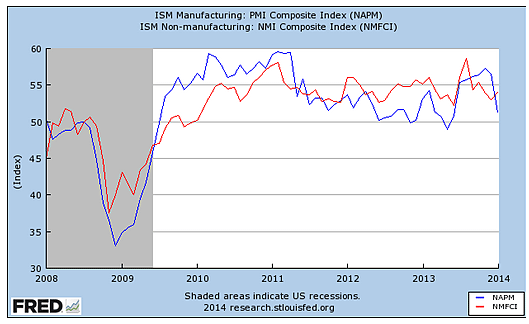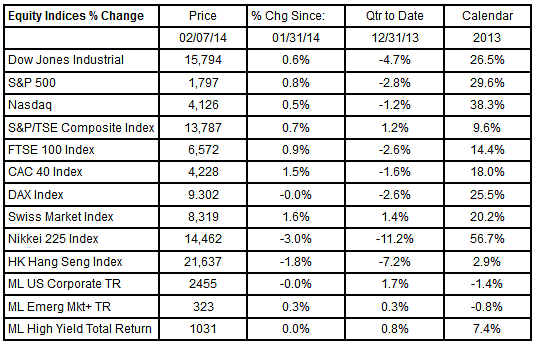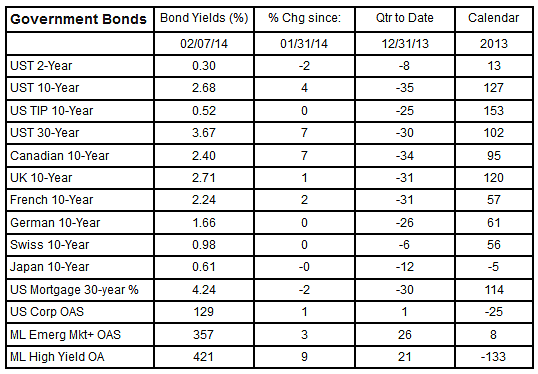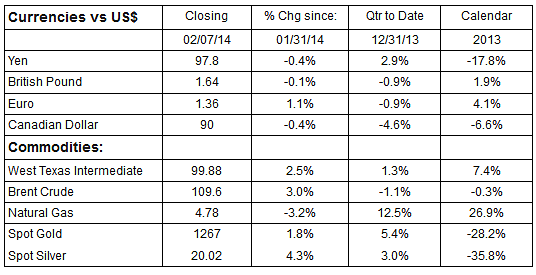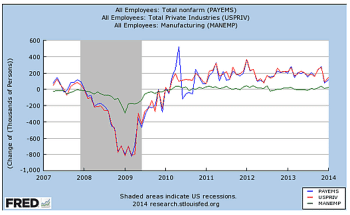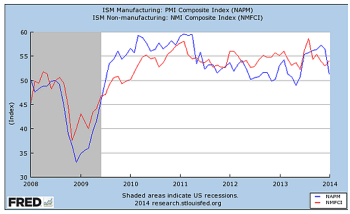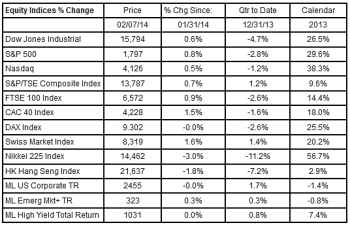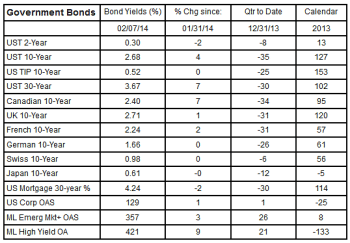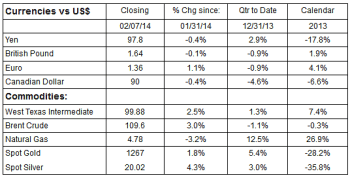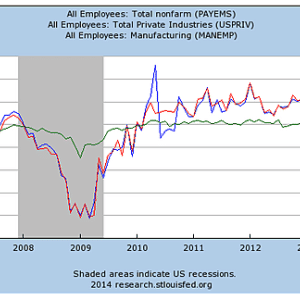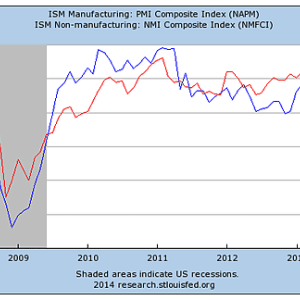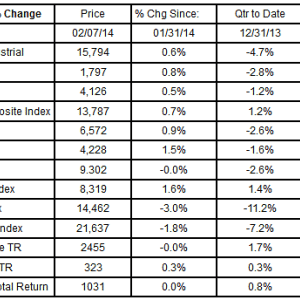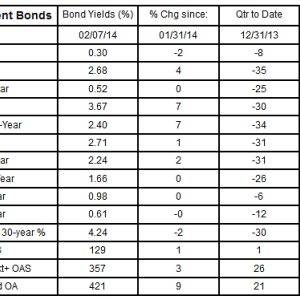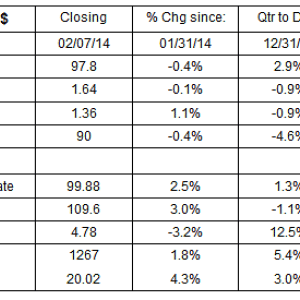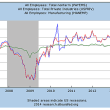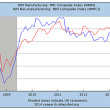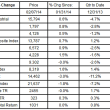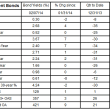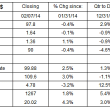John Davidson's Economic Comments: Week ending Feb. 7
The U.S. Employment report disappointed, but the economic releases indicated that the economy continued to expand, but without any signs of the hoped-for acceleration. Most Purchasing Managers' Indices signaled expansion, although some were lower than their December postings. Equity markets in the U.S. and Europe managed to post a positive week, but Asian markets slid. Bond yields were higher and credit spreads were wider on the week. Oil and metals commodity prices were also higher on the week.
Perspective:
Surveys of Purchasing Managers provide a good indication of economic activity. Purchasing Managers are the ones that oversee purchases of materials and services for production or creation of goods and services that are sold. Their results are released early in the following month so that these indices are timely and widely followed. PMIs of 50 and above indicate that activity is expanding; PMIs below 50 indicate contraction. In the U.S., the Institute of Supply Management has been conducting these surveys for many years and they remain the most closely followed. In recent years, another organization, Markit, has conducted surveys of purchasing managers both here and elsewhere.
I believe that they provide some insight and regularly report their results here. Yet, news organization often quote these reports as if they were a measure of output instead of survey results; some explanation may be in order. For example, in the chart included you will see that the January ISM's Manufacturing PMI survey dropped five points from 56.5 to 51.3. The media reported that U.S. Manufacturing had dropped when, in fact, most purchasing managers still see manufacturing in expansion (above 50); clearly their view of manufacturing activity was less positive than it was in December, but manufacturing activity was not falling. I hope that this explanation is helpful as you see the PMIs for January reported below.
On a personal note, the late posting of this week's Comments was due to travel that took us from Quebec with friends, to St Louis to visit my mother, and to Seattle for my sister's birthday. Weather delays also provided more than adequate time in the Chicago Airport. It is what we do for family that makes it all worth it. The PMI for family is well into the expansion zone!
Economic Releases:
The U.S. Employment report for January was weaker than expected. In fact, the Non-farm Payrolls (blue in the chart) of 113,000 was below the range of expectations. Private Payrolls (red in the chart) of 142,000 was also on the low end of expectations. Manufacturing (green in the chart) added 24,000 jobs. Some may wonder why I include this manufacturing component because it is so small. I do so by historic habit, but also because so much in the press discusses the loss of manufacturing jobs that I thought that it should be in perspective. Not shown on this chart is the Unemployment Rate, which ticked down to 6.6% on a rapid rebound in the labor force. Average Hourly Earnings rose +0.2% and the Average Workweek was unchanged at 34.4 hours. Still, weaker than expected, but the Non-farm Payrolls rose an average of 154,000 during the final quarter of the year, an expansion of the labor force. The weekly Initial Claims for Unemployment fell 20,000 to 331,000 in the week of Feb. 1; the four-0eek average of Claims inched up to 334,000; Continuing Claims rose 15,000 to 2.964 million
The U.S. ISM Purchasing Managers' Indices for January had mixed results. The Manufacturing PMI (blue in the chart) fell six points to 51.3 while the Services PMI (blue in the chart) rose a point to 54.0. The Markit PMI for Manufacturing dropped over a point to 53.7; its Services PMI rose a point to 56.7. All of the U.S. PMIs remained in the expansion zone, above 50.
Other Economic Releases
The European Central Bank met this week and made no changes in its policy rates, as expected. The Bank of England also met and kept their rates and Asset Purchase Levels unchanged at 0.5% and 375 billion pounds.
The European Union's PMI for Manufacturing rose to 54.0 in January; the Markit Composite PMI rose to 52.9 while the Services PMI rose to 51.6. Germany's PMI for Manufacturing rosetwo2 points to 56.5; the Markit Composite PMI rose to 55.5, but the Markit Services PMI slipped two points to 53.1. France's PMI for Manufacturing rose two points to 49.3, but remained in the contraction zone, as did the Markit Composite PMI and Services PMI both at 48.9. The UK's CIPS/PMI for Manufacturing slipped a point to 56.7 and the PMI for Services slipped a half point to 58.3.
Putting further pressure on emerging markets, China's Composite PMI fell a half point to 50.8 and the Services PMI slipped two ticks to 50.7. Japan's Composite PMI increased a tick to 54.1, but its Services PMI fell a point to 51.2.
Equities Markets:
Most of the U.S. and European markets managed to post a positive week this week. It is unclear whether the bleeding stopped because of bandages that have been applied or because the economic bodies ran out of fluid. Asian markets continued to slide; Japan led the retreat.
Bond Markets:
Government Bond market yields finished the week a touch higher. Credit spreads widened as investors demanded more yield to assume default risk.
Currencies & Commodities:
The U.S. dollar rose against the Yen, Pound and Looney. Even our expenditures at the Quebec Winter Carnival last week failed to rally the Canadian currency. Oil prices and metals commodity prices rose, but natural gas prices eased this week with the easing of the cold vortex, which had gripped the midwest and eastern half of the nation.
Who is John Davidson?
John W. Davidson, CFA, started writing these Comments more than a decade ago as a personal discipline when he was promoted to from portfolio manager to chief investment officer and CEO.

Most recently, he was the president of PartnerRe Asset Management Corporation, responsible for the management of PartnerRe's invested assets, which grew from $4 billion to $12 billion during his tenure. After joining PartnerRe in the fall of 2001, he hired the staff, built the trading floor and created the infrastructure to manage both fixed income and equity assets internally. He retired from PartnerRe at the end of 2008 and moved to Maine, where he focused on board work.
He has more than 35 years of industry experience, including positions with investment management responsibility for separate institutional accounts, mutual funds, trusts and insurance assets. Prior to joining PartnerRe, he served as president and chief executive officer of two other investment management companies. For various companies he has held positions as chief investment officer, chief economist, head of fixed income and portfolio manager. As a portfolio manager, Davidson managed and traded U.S. Government Securities as well as futures and options on fixed income instruments.
His real world experience is backed by a strong academic foundation, which includes earning a Master of Business Administration in finance and a Master of Arts in mathematics from Boston College, as well as a Bachelor of Arts, cum laude, in economics from Amherst College. He holds the professional designation of chartered financial analyst.
His experiences and credentials have brought him to the public as a television commentator and conference speaker. In addition to his frequent past appearances on CNBC, CNNfn, Bloomberg TV and Yahoo FinanceVision, he appeared as a special guest on Wall $treet Week with Louis Rukeyser. Reuters, Bloomberg and other business press services have quoted his views on the market. He has taught CFA preparation programs, as well as other courses offered by the Stamford and Boston CFA Societies, and the National Graduate Trust Officers' School.
Davidson is a natural leader in both his professional and personal life, having developed those skills early in his career as a naval officer. He spent three years on active duty, which included a year on the rivers of Vietnam, and 24 years in the Naval Reserve, from which he retired as a captain in 1994.
Davidson is treasurer and board member of the Camden Conference. He is also on the investment committee of the Pen Bay Health Foundation. He serves as an independent trustee for mutual funds.
In his leisure time, he is an active sailor, tennis player and skier. With his wife, Barbara, he renovated a 100+-year-old home in Camden, where they enjoy spending time with their two golden retrievers and having visits from their five children. He can be reached at jwdbond@me.com.
Event Date
Address
United States


